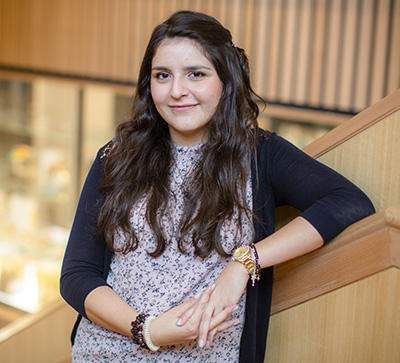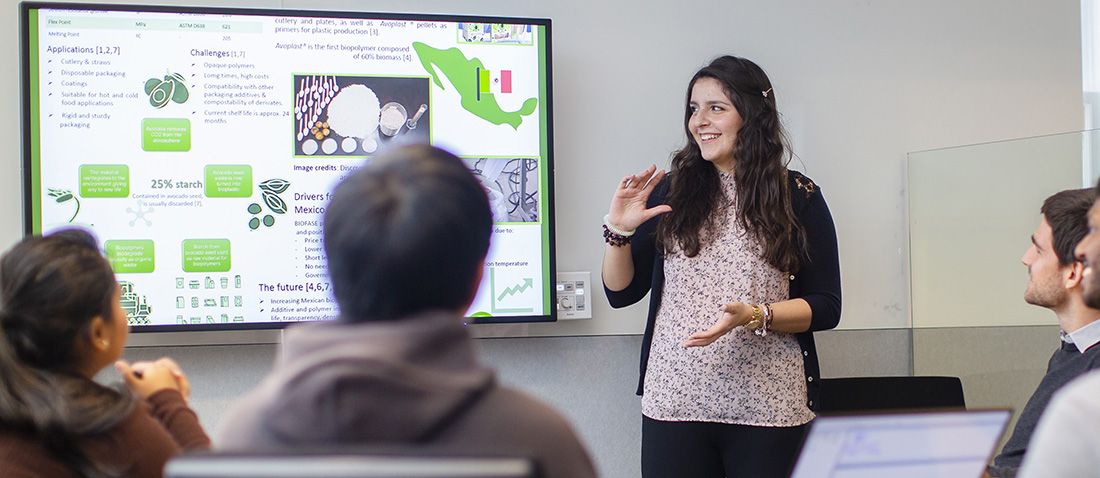 Maria Becerril Roman (Mexico) was drawn to the Master of Food and Packaging Innovation by her curiosity about food and drive to improve the health and sustainability of our food systems.
Maria Becerril Roman (Mexico) was drawn to the Master of Food and Packaging Innovation by her curiosity about food and drive to improve the health and sustainability of our food systems.
“You can have a great food product, but if you don’t get the packaging right it won’t sell or it won’t have a long shelf life and will be wasted, so packaging is an important component in the value of food,” she says.
Maria Becerril Roman says the Master of Food and Packaging Innovation combined industry engagement, academia, management, marketing, engineering and other disciplines.
“I was really surprised to see there was a degree that combines both food production and packaging technologies, and it seemed like a great option, offered only at the University of Melbourne.”
The Master of Food and Packaging Innovation combines food science, packaging processes and design, consumer behaviour, innovation and value creation with an industry internship or research.
It was created in collaboration with major food and packaging manufacturers, and core packaging subjects alone have around 20 guest lectures by industry experts including members of the Australian Institute of Packaging (AIP), the peak professional body for packaging education and training.
Smart packaging design keeps food safe to eat for longer, protects it from damage, uses materials with minimal environmental impact and engages consumers by telling the story and provenance of the food.
Maria says there are many opportunities to appeal to consumers’ ethics with sustainable packaging.
“For example, there is an egg carton by an award winning designer that is made from paper pulp, flour and starch and contains legume seeds that grow if the packaging is planted rather than discarded,” she says.
Maria presents on biodegradable packaging made from avocado seed waste in a Value Chain Analysis class in 2019.
“This not only benefits the soil, but increases consumer engagement and awareness about the importance of sustainable packaging alternatives to landfill.
“Those ingredients are biodegradable aside from the seeds, so you can plant it after use to grow new plants which as legumes, fertilise the soil. It’s a two-pronged approach to sustainability, because even if the product is sent to landfill or discarded thoughtlessly, it can have environmental benefits.”
The Master of Food and Packaging Innovation provides opportunities to both apply a creative and critical approach to issues like these, and gain experience in the food and packaging industries.
Maria completed a food quality and safety management internship with yoghurt and dairy manufacturer PZ Cussons and says the opportunities she had to learn from guest lecturers from the Australian Institute of Packaging (AIP) and networking with people in the industry have been highlights of the course.
“Most of the masters degrees I found in food were oriented towards academic research, but I knew I wanted to work in research and development for industry,” she says.
“I knew the science, but I didn’t know how to sell it or transform it into something people would like to pay for. This degree combined everything – it combined industry, academia, management, marketing, engineering and other disciplines. It was so useful and relevant for what I wanted to do.”
She also gained leadership, marketing and events management experience during the Master of Food and Packaging Innovation as executive secretary for the Graduate Agriculture and Food Society.
“Managing events, networking and funding requires a different skillset to academia,” Maria says.
“I managed memberships, contributed to bringing more students to the club and keeping them engaged. I also networked at faculty events to get contact details of people in the industry and would bring them as guests to speak to other graduate students to grow their networks and their knowledge of the industry outside classes.”
Maria is interested in integrating the food system with public health, social responsibility and environment in her career.
“I know I want to pursue sustainable initiatives into either the food or packaging industries, and I am open to different kinds of opportunities in the supply chain, regulatory affairs, quality assurance, or research and development,” she says.
“Food is fascinating and full of opportunities, even during pandemics.”
The Master of Food and Packaging Innovation is an inter-disciplinary degree that explores food processing, entrepreneurship and innovation in product and packaging design at an advanced level. The Master course is a joint initiative between the University of Melbourne and the AIP. http://aipack.com.au/education/master-of-food-and-packaging-innovation/

